作者序一
蘇秦
一般而言,詞彙可概略分為生活詞彙、工作詞彙與專業詞彙等範疇,若對照英語能力分級檢測的命題規劃,初級與中級的試題多以生活詞彙為主,字數約4500至5000,中高級試題偏向工作詞彙,涵蓋約7000字,中高級以上就完全鎖定在專業詞彙方面,字數當然就不限了。
因此,若要在職場以英語溝通得宜,字彙量起碼就要達到7000字了。本書即是針對具有7000字彙量需求的讀者或學習者而規劃編寫的。
一個人的字彙使用狀況又可分為主動詞彙(active vocabulary)與被動詞彙(passive vocabulary)兩種,主動詞彙是指能夠聽說讀寫運用自如而且表達得宜的詞彙,被動詞彙則是指無法完全理解或正確使用的詞彙,一個人的被動詞彙量都是遠超過主動詞彙。這兩種層次的詞彙對一個人的語言表達都同樣有貢獻,而且都同時在增加中,也就是說,我們隨時會遇到新的詞彙,因為不熟練,所以是被動詞彙;另一方面,一些原本不熟練的詞彙因為使用頻繁而變成熟練的主動詞彙。如果一個人擁有7000主動詞彙的話,那就快成為英語小魔男或小魔女了!
基於協助讀者能夠藉由本書習得足夠主動詞彙,本書中每一個詞條例句都是以實用為目標,希望以正統、簡潔而且精確的美式英語用法,提供讀者探究、推敲,模仿、練習詞彙用法範例,以屏除文法堆砌的不良文句,達到減少誤用窘境,展現優質英語學習風貌。若讀者能因本書而使英語能力更上層樓,那將是本人編寫本書最大的回饋。
本書稿件繁多,然寫作時間倉卒,若非靖悅同學協助處理音標,黛芬與台北市立南湖高中李薇、李姿馨同學試閱文本,摯友Chris審閱稿件,本人將無法完成此一著作,以饗讀者,本人謹此致謝。
作者序二
Chris Forbrook
Vocabulary, as we all know, is very important in being able to communicate in any language. And so, this book you have in your hands has lots of words. One of the hopes I have for this book is that it will expose you to, and increase your understanding of, some vocabulary and how they are used.
As you look at the example sentences in this book, try to notice what parts of speech go together, such as which verbs go with which nouns, and vice versa. As you learn new vocabulary, use these words with some of the verbs and nouns you have learned previously. You will be required to do some guessing, and you will guess incorrectly sometimes, but there is nothing wrong with that. Many students I have taught were afraid of making mistakes, but there is an important point to remember: all of us made many, many mistakes in our native language (and perhaps still do) as we were growing up. Our ability in our native language became refined only through using the language and receiving correction from our parents and our teachers. So, look for patterns in the language and then experiment. If you are in an English class, you can ask your teacher to listen to or read some of your guesses as you try to work with new vocabulary, or if you are studying by yourself, find someone who is proficient enough in the language (perhaps a pen friend, language exchange, or friend) to give you their input.
It is my hope that this book will serve as a supplement to your learning vocabulary. I emphasize supplement because words can have many meanings and uses, and one book cannot paint a clear picture of all of those meanings and uses, not even a formal dictionary. To illustrate, think of a word in your native language. Write it down. Then, think about how many different ways that word can be used and how the meaning can vary according to the context. English is no different in this way. Broaden your knowledge of vocabulary by reading and interacting with other people in English. To more fully grasp the meaning of any word, you’ll need to see it or hear it used in many ways. Reading is a great way to learn vocabulary, but choose a text carefully. I suggest finding something you enjoy and one that you can understand at least seventy to eighty percent of the words on any page. That way, you can find the reading enjoyable and useful.
And, if you don’t already do this, I encourage you to accept personal responsibility in the development of your language ability. Don’t passively wait for teachers to tell you what to learn or how it should be learned. Teachers can serve as helpful guides, but you need to actively seek your own style and ways to help yourself learn. It is good for us to have confidence in teachers, but it is more important to have confidence in ourselves, and confidence is gained through personal experience. I believe that you will find learning more rewarding as you experiment and look for your own ways of remembering and learning. We cannot ask another person to read a book and then we get the knowledge, right? We must learn for ourselves.
Finally, I wish you the best in your learning journey. I hope you can find enjoyment and a feeling of achievement from learning English, and that this book will be of help to you on your journey. Be patient with yourself, have faith in yourself and never give up!



 天天爆殺
天天爆殺  今日66折
今日66折 


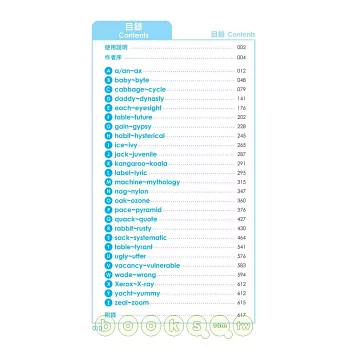
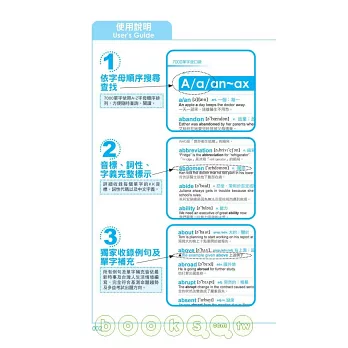
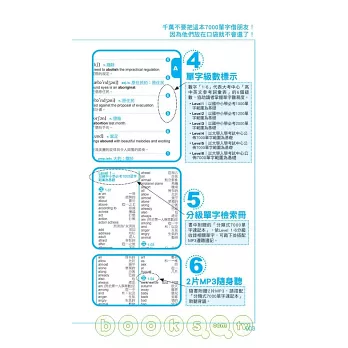
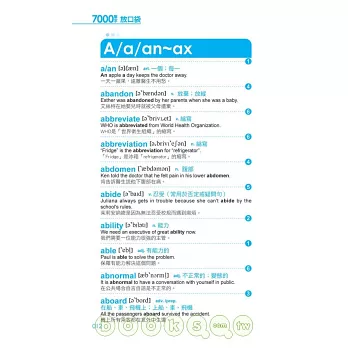
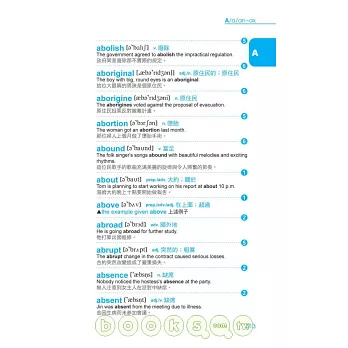
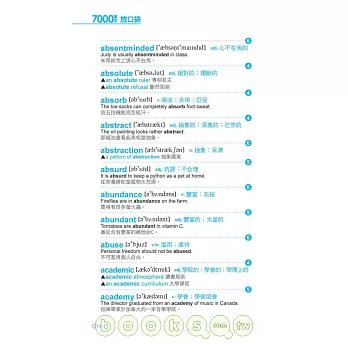
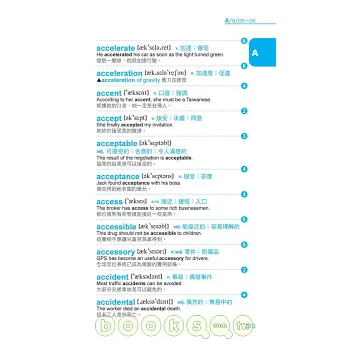
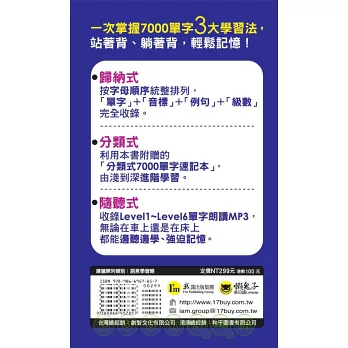






















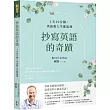
 博客來
博客來 博客來
博客來 博客來
博客來 博客來
博客來 博客來
博客來